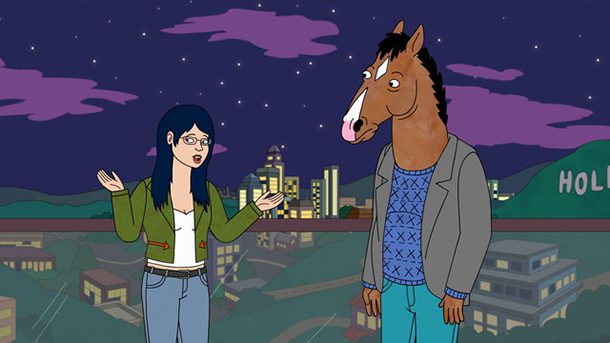When Netflix announced BoJack Horseman, my excitement boner almost upended my laptop. The original series, created by Raphael Bob-Waksberg (who has almost nothing else to his name; he had a role on one episode of Children’s Hospital, and wrote an episode of some NBC show called Save Me) centers around the titular horse, previously the star of an incredibly lame ’90s sitcom called Horsin’ Around. But here in 2014, he’s more or less a nobody, and surrounds himself with his childish, semi-sycophantic housemate Todd, his agent/ex-girlfriend Princess Carolyn (a giant pink cat), his memoirist Diane Nguyen, and Diane’s boyfriend, an eternally upbeat dog named Mr. Peanutbutter, himself the star of a Horsin’ Around ripoff called Mr. Peanutbutter’s House.
The plot sounds fine, and I like the idea of a world cohabited by humans and anthropomorphic animals. But what really sold me was the voice cast: Will Arnett as BoJack, Aaron Paul as Todd, Amy Sedaris as Princess Carolyn, Alison Brie as Diane, and Paul F. Tompkins as Mr. Peanutbutter. That is just a murderer’s row of talented, funny actors, and BoJack buoys itself with great recurring turns from the likes of Patton Oswalt, Kristen Schaal, and Wyatt Cenac. Actors like Naomi Watts and Wallace Shawn show up to play exaggerated versions of themselves, and Arnett’s The Millers co-star Margo Martindale shows up in a few episodes as well (where everyone refers to her as “character actress Margo Martindale,” even to her face).
The main narrative of BoJack is pretty by-the-numbers at first blush. BoJack is under contract to write his memoir, but is getting nowhere, so his publisher brings in Diane to be his ghostwriter. Where the show succeeds most is in subverting expectations: after the pilot, it looks as though the book is going to be the main focus of the season, but nope, that’s wrapped up about halfway through. Then, when BoJack realizes he’s in love with Diane, he tries to sabotage her wedding to Mr. Peanutbutter, and it looks like that will be the focus of the season’s latter half. Again, no; Diane gets married one episode later, and spends the rest of the season as Mr. Peanutbutter’s wife. (At first I was a bit put off by Alison Brie voicing a Vietnamese character, but I got over it; after all, Cleveland on Family Guy is voiced by the very white Mike Henry, and it’s not like BoJack is a live-action show featuring Brie playing Diane in yellowface.)
One thing I admire about BoJack is its commitment to running jokes – for instance, at one point BoJack steals the D from the Hollywood sign so he can give it Diane, and for the remaining episodes characters refer to the town as “Hollywoo.” This commitment extends to the narrative as well. Bob-Waksberg is less interested in making a sitcom than he is in telling a fully-formed story, with character development and tangible repercussions for their actions, like when BoJack sabotages Todd’s five-hour rock opera Newtopia. Todd is hurt, and the sense of betrayal drives a wedge between their friendship that ultimately leads to Todd becoming Mr. Peanutbutter’s assistant who also helps him think of hair-brained ideas (such as a Halloween store open only in January, or a film that gradually morphs into a bi-montly curated snack basket). It’s worth mentioning that Arnett and Paul have great chemistry together, and I wish the latter would do more comedy.
BoJack stumbles in its tonal disparity; at one point it’s a comedy about a narcissistic, misanthropic has-been actor who just happens to be a horse, and at another point, sometimes in the same scene, it’s a glum character study about someone wondering if they’re a good person beneath all their bluff and bluster. The fault doesn’t lie with the cast; Arnett, Paul, and Brie all achieve admirable levels of pathos (even if Tompkins’ Mr. Peanutbutter remains pretty one-note throughout the season). I would blame Bob-Waksberg and his writers. What they’re attempting is laudable, and surprisingly mature for a show that features its main character puking cotton candy off of his balcony in the first episode. But the switch often comes too quickly to be effective. To the show’s credit, BoJack’s drug trip in “Downer Ending,” wherein he envisions a life in Maine with Charlotte, a fawn he once loved, is genuinely affecting.
There are some great episodes here, though, particularly the second one, “BoJack Hates the Troops,” where BoJack finds himself in hot water after stealing a Navy Seal’s muffins then inadvertently calling the troops “jerks.” (It also gives us the great line, “I ate them all and I didn’t even want one!“) In fact, there are no real groaners to be found, although some episodes are decidedly darker than others, to the point of being almost bereft of jokes. I’m speaking mainly about the episode where BoJack goes to visit the cancer-ridden Herb Kazzaz, his former best friend and the creator if Horsin’ Around. BoJack betrayed him back in the ’90s, and the show does a good job of showing the toll that the TV industry can take on a friendship.
I wouldn’t go so far as to call BoJack Horseman a mixed bag. The show succeeds far more often than it fails, and the voice cast makes it a delight to watch. Arnett is inspired casting, and his gravelly voice lends BoJack the perfect air of world-weariness. Put it this way: I watched all twelve episodes in a matter of days, and when it was over, I found myself thinking, “Ah shit, that’s all there is?” Consider me very excited for season two.




